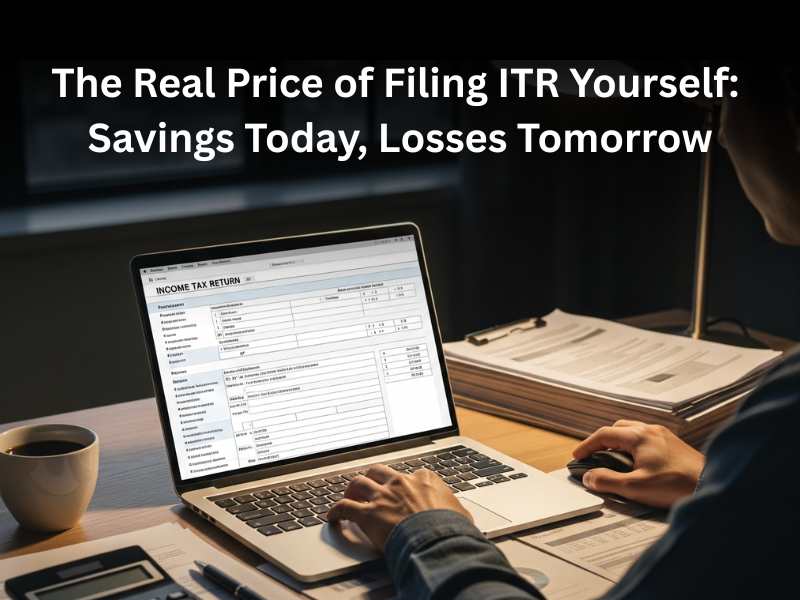Team SKM,
As the Income Tax Return (ITR) deadline approaches, many taxpayers face a common dilemma: “Should I file my ITR myself and save on a professional’s fee, or hire a Chartered Accountant (CA)?” While the do-it-yourself (DIY) route looks tempting, it often turns out to be a classic case of being “penny-wise and pound-foolish.”
The few hundred rupees saved today can lead to much bigger financial and legal troubles tomorrow. Filing ITR isn’t just about filling out a form – it’s about accuracy, compliance, and safeguarding your financial future.
The Pitfalls of DIY Filing
For simple cases, such as salary-only income, online portals may seem straightforward. But once your financial life gets slightly complex, DIY filing can turn into a minefield. Here are some common mistakes:
- Choosing the Wrong ITR Form
Different income sources require different forms (salary, business, capital gains, etc.). Picking the wrong one can invalidate your return. - Missing Out on Deductions
From home loan interest to medical insurance, there are many deductions. Professionals know the tax code deeply and can ensure you maximize your tax savings. - Tax Planning Calculations & Eligibility for Deductions
Many taxpayers are unsure about which deductions apply to them – like Section 80C (investments in PPF, ELSS, life insurance), 80D (medical insurance), or 24(b) (home loan interest). A small mistake in calculations can lead to either under-claiming (losing benefits) or over-claiming (attracting penalties). A CA ensures correct eligibility and accurate computation, avoiding both extremes. - Ignoring All Income Sources
Many taxpayers forget to report interest from savings accounts, FDs, or capital gains from mutual funds – mistakes that can trigger tax notices. - Shifting of Incomes to Non-Taxable from Taxable
Tax planning allows certain incomes to be legitimately shifted to non-taxable categories – for example, investing in tax-free bonds, claiming HRA benefits properly, or routing allowances correctly. DIY filters often overlook these strategies, ending up paying more tax than necessary. - Incorrectly Reporting Multiple Incomes
Changed jobs during the year? Reconciling multiple Form 16s is often confusing and error prone. - Failing to Verify the Return
Filing isn’t complete until you verify. Forget this step, and it’s as if you never failed at all.
These mistakes don’t just reduce your refund; they can result in penalties, interest, or even scrutiny notices from the Income Tax Department.
Real-Time Challenges Faced by Taxpayers
Even tech-savvy taxpayers often run into unexpected hurdles while filing returns:
- Bank Account Validation Errors
Many face errors when validating bank accounts on the portal. The solution is to check under ‘My Bank Account’ in the ‘My Profile’ section and ensure the details are correct. A pre-validated bank account is mandatory for receiving refunds. In case of persistent issues, the return can be filed using the offline utility. - Special Income like Crypto Trading, Overseas Assets
Income from crypto transactions or ownership of overseas assets requires detailed disclosures in advanced ITR forms. Failing to declare such income correctly can attract penalties and strict scrutiny from the tax authorities. Checking Form 26AS and AIS becomes crucial before filing in such cases. - Filing Form 10IEA for Tax Regimes
Once Form 10IEA is filed for AY 2024–25, the taxpayer must continue under the old tax regime for that year – it cannot be reversed. The option can only be changed in the next assessment year. - Understanding New Tax Regime Provisions (115BAD, 115BAE, 115BAC)
- Section 115BAE: For new co-operative societies (incorporated on/after April 1, 2023) in manufacturing. Tax rate: 15% on manufacturing income, 22% on other income. Requires file Form 10IFA.
- Section 115BAD: For other co-operative societies (registered on/after April 1, 2021). Tax rate: 22% on total income. Requires filing Form 10IF. Once opted, it cannot be withdrawn in later years.
- Section 115BAC: Applies to AOPs, BOIs, AJPs filing ITR-5. They can choose revised new regime tax slabs by submitting Form 10IEA within the due date (mandatory for business income).
Without expert guidance, these provisions can confuse even seasoned taxpayers, leading to costly errors.
The Value of an Expert
Hiring a CA is not just about convenience, it’s an investment in financial security. A professional assures:
- Your return is accurate and compliant with the latest tax laws.
- All eligible deductions are claimed, maximizing refunds.
- You receive strategic tax planning advice for future years.
- You have representation in case of scrutiny, saving stress and money.
A CA’s fee may look like an expense, but compared to penalties, interest, or a prolonged tax notice battle, it’s a very small price to pay.
✅ Final Word: DIY filing might save a few hundred rupees today, but the hidden risks and missed opportunities can cost you thousands tomorrow. With complex tax rules, frequent law changes, and technical portal challenges, the safest option is to let an expert handle your ITR – so you can enjoy peace of mind along with maximum savings.

